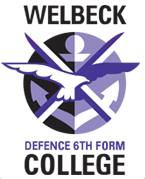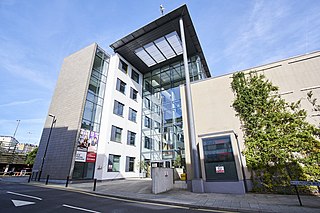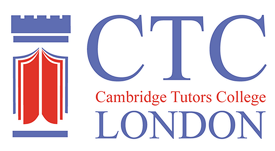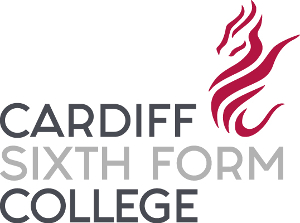
Oxbridge is a portmanteau of Oxford and Cambridge, the two oldest, wealthiest, and most famous universities in the United Kingdom. The term is used to refer to them collectively, in contrast to other British universities, and more broadly to describe characteristics reminiscent of them, often with implications of superior social or intellectual status or elitism.
In the education systems of England, Northern Ireland, Wales, Jamaica, Trinidad and Tobago and some other Commonwealth countries, sixth form represents the final two years of secondary education, ages 16 to 18. Pupils typically prepare for A-level or equivalent examinations like the IB or Pre-U. In England, Wales, and Northern Ireland, the term Key Stage 5 has the same meaning. It only refers to academic education and not to vocational education.

Haileybury, formally Haileybury and Imperial Service College, is an academically selective, co-educational public school for 11- to 18-year-olds near Hertford in England. It is a member of the Rugby Group and enrols pupils at the 11+, 13+ and 16+ stages of education. Over 890 pupils attend Haileybury, of whom more than 550 board.

Matriculation is the formal process of entering a university, or of becoming eligible to enter by fulfilling certain academic requirements such as a matriculation examination.
A cram school, informally called crammer and colloquially also referred to as test-prep or exam factory, is a specialized school that trains its students to achieve particular goals, most commonly to pass the entrance examinations of high schools, or universities. The English name is derived from the slang term cramming, meaning to study hard or to study a large amount of material in a short period of time.

Dame Allan's Schools is a collection of private day schools in Fenham, in the west end of Newcastle upon Tyne, England. It comprises a coeducational junior school, single-sex senior schools and a coeducational sixth form. Founded in 1705 as a charity, the original schools are two of the oldest schools in the city.

Welbeck Defence Sixth Form College, formerly named and often referred to as simply Welbeck College, was an independent, selective sixth form college in Leicestershire, England. While run as a sixth form college, the school was an institution of the Ministry of Defence and part of the Defence Academy of the United Kingdom.

Harrogate Tutorial College in Harrogate, North Yorkshire, England was a small co-educational private school. HTC specialised in preparing students for university and teaches GCSE and A-level qualifications in tutorial classes. The college's admissions policy and style of teaching made it a popular choice among pupils of British public schools who had not met the often restrictive academic requirements of their schools to proceed to A-level. Attracting many overseas students wishing to enrol at British universities, the college also provided English language courses which were often taught in combination with academic subjects. Special preparation was offered to Oxford and Cambridge applicants and 90% of HTC students secured places at university.

Mander Portman Woodward is a group of British independent schools, with branches in London, Birmingham and Cambridge, offering GCSE and A-Level courses.
The Ladies' College is a private day school for girls in Saint Peter Port, Guernsey. The school was founded on 10 October 1872 in order to provide academic education to girls on the island and was modelled after Cheltenham Ladies' College. As a member of the Girls' Schools Association (GSA), it is a public school in the British sense of the term.

The A-Level is a subject-based qualification conferred as part of the General Certificate of Education, as well as a school leaving qualification offered by the educational bodies in the United Kingdom and the educational authorities of British Crown dependencies to students completing secondary or pre-university education. They were introduced in England and Wales in 1951 to replace the Higher School Certificate.

Rochester Independent College (RIC) is an Independent Schools Council accredited co-educational, private day and boarding school, in Rochester, United Kingdom. It was established in 1984.

Greene's College Oxford is an independent sixth form tutorial college in Oxford, England. The college specialises in providing bespoke one-to-one tuition for students of any age, though particularly 16-18-year-olds. Greene's is situated near Pembroke College and Christ Church - two constituent colleges of the University of Oxford.
The Worthgate School(formerly CATSCollege Canterbury,Stafford House College) is a coeducational Private day and boarding school located in Canterbury, England, catering primarily for foreign students. It is owned by the CATS Global Schools group. The school specialises in preparing students for pre-university exams such as A-Levels and the International Baccalaureate as well as providing additional English tuition.

Bellerbys College was a series of two private international co-educational boarding schools based in the UK, owned by Study Group. It offered students subject pathway courses.

Cambridge Tutors College is a private school and sixth form situated in South Croydon, outer London. It was founded in 1958 as a tutorial centre to help boys prepare for their Common Entrance Examination. Students come from over twenty countries, including China, Malaysia, Thailand, Vietnam, Singapore, Myanmar, the Baltics, Balkans, Nigeria, Russia, Ukraine and Kazakhstan.
Ashbourne College is a private school and sixth form located in Kensington, London, England.
David Game College is a private school and sixth form based in Tower Hill, London. The college is coeducational and admits students between the ages of 13–22. Up to 400 students take full-time courses each year.

Cardiff Sixth Form College, abbreviated to CSFC, is an independent mixed education sixth form college in Cardiff, Wales for 15- to 19-year-olds. The college is owned by Dukes Education.
Haringey Sixth Form College is a mixed sex sixth form college located in the Tottenham area of the London Borough of Haringey, United Kingdom.












